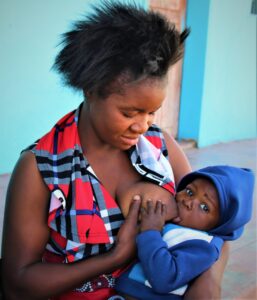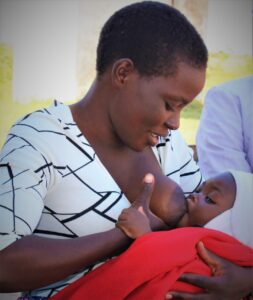By Lwandamo Katondo
 Lactating mothers in Kalabo district of Western province are in support of the global campaign for breastfeeding, and have pledged to help raise awareness among communities in a bid to fight against malnutrition among children who are below 2 years of age.
Lactating mothers in Kalabo district of Western province are in support of the global campaign for breastfeeding, and have pledged to help raise awareness among communities in a bid to fight against malnutrition among children who are below 2 years of age.
“Breast milk is ideal for infants, highly nutritious food and contains antibodies which help protect babies against many common childhood illnesses such as diarrhea and pneumonia. It provides all the energy and nutrients that the infant needs during the first months of life. My 9 months old baby boy has hugely benefited from successful breastfeeding,” testifies Mwangala Pumulo, a lactating mother.
Ms Pumulo, 35, lives in Liunga village of Lukona sub-chiefdom, Kalabo district. She is one of the several lactating mothers who turned up for the World Breastfeeding Week which was commemorated between 1st – 7th August 2022 under the global theme “Step up for breastfeeding: Educate and Support” in a bid to generate public awareness and support for breastfeeding.
The campaign was held at Libonda and Lukona health facilities and was characterized by focus group discussions, drama and demonstrations. The performances highlighted various breastfeeding benefits, myths, positions and challenges in a bid to curb stunting among children especially within the first 1000 days of a child’s life.
“It is important to encourage lactating mothers to continue breastfeeding until the baby’s second birthday. The benefits of breastfeeding increase when the mother takes a diversified and balanced diet. Mothers, especially young ones, also need a lot of support as well as counselling so that they adopt recommended breastfeeding positions and dismiss widespread myths,” she explains in one of her performances.
Mundele Katongo, 26, of Kandiana village in Lukona sub-chiefdom, and a mother of a 5 year old girl shares her experience. She observes that higher impact in reducing stunting and other forms of malnutrition among children can be achieved by encouraging lactating mothers to adhere to exclusive breastfeeding.
“Breastfeeding must be initiated within the first hour of a child’s birth. A mother must also ensure that the newly born baby sucks colostrum which is the first form of breast milk that is released by the mammary glands after giving birth. This thick and yellowish in color milk is highly-concentrated, nutrient-dense and high in antibodies which help a newborn baby build a strong immune system against diseases.
“During the first six months of life, the baby must only be given breast milk on demand. During this period, no additional food, drink or even water must be given to the baby except for prescribed mineral supplements, vitamins or conventional medicines. Around the age of 6 months, an infant’s energy and nutrient needs starts to exceed what is provided by breast milk.
“At this stage, the infant must be introduced to complementary food in addition to breast milk. The complementary food must be well selected, diverse and in right amounts among others to provide sufficient energy, protein and micronutrients to cover the child’s energy and nutrient gaps,” she shares her experience.
The campaign was organized by the National Food and Nutrition Commission through Scaling Up Nutrition (SUN). It attracted the participation of staff from the Ministry of Health who offered additional support, counseling tips and messages against breastfeeding myths.
Nursing officer Liwakala Liwakala noted that World Breastfeeding Week offers an opportunity to sustain the gains, address gaps and advocate for successful breastfeeding.
“Studies have proved that successfully breastfed children have optimum cognitive abilities, perform better, intelligent and less likely to be malnourished. Furthermore, women who breastfeed also have a reduced risk of breast cancer.
“However, various traditional myths pose serious challenges and therefore call for action, concerted efforts and mass community sensitizations by all stakeholders. Some of the common myths include the provision of water and complementary food as well as oral administration of weight enhancing concoctions to infants less than 6 months of age. Others discourage HIV positive mothers against breastfeeding,” he said.




